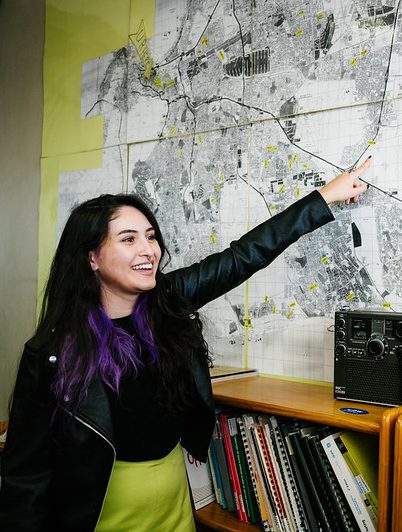RESOURCES
2024-12-12
The Role of Environmental Activists in Today's Climate Crisis
Explore the impact of environmental activists and discover how Tilting Futures’ programs empower the next generation of changemakers.
Published by Tilting Futures

Environmental activism has emerged as a powerful force in the global fight against climate change, pollution, deforestation, and biodiversity loss. At its core, environmental activism is about advocating for practices and policies that protect our planet and promote sustainable development. Environmental activists raise awareness of ecological issues, demand accountability from corporations and governments, and champion sustainable alternatives. Their work is essential as the planet faces unprecedented environmental challenges that threaten ecosystems and human health.
Today, the need for environmental activists is greater than ever. As the climate crisis intensifies, activists play a vital role in driving necessary change. However, there is an urgent demand for new leaders to join this movement. Programs like Tilting Futures’ Take Action Lab empower young people to step up as environmental advocates by equipping them with hands-on experiences and essential skills. This program prepares young changemakers to lead effective and sustainable solutions that address the pressing environmental issues of our time.
The Evolution of Environmental Activism
Early Environmental Movements
Environmental activism has roots that extend far back in history, though it began to take on more organized forms in the 19th and early 20th centuries. Early movements arose in response to industrialization, which brought environmental degradation, pollution, and poor working conditions. Conservation became a priority in many countries, with individuals advocating for the protection of natural landscapes and resources. Notable figures such as John Muir, an advocate for the preservation of wilderness in the United States, and Aldo Leopold, a pioneer of the environmental ethics movement, laid the groundwork for the activism we see today. Their efforts led to the establishment of national parks and legislation aimed at conserving natural spaces for future generations.
These early movements laid the foundation for modern environmental activism, with an emphasis on both protecting nature and ensuring that human activities do not irreparably damage the environment. Early environmentalists also established the principle that collective action can achieve substantial change, inspiring future generations to mobilize for a healthier planet.
Modern Environmental Activism
Modern environmental activism has evolved to meet new and complex challenges such as climate change, biodiversity loss, and large-scale pollution. Unlike the localized campaigns of the past, today’s activism is often global, interconnected, and multifaceted. Activists today focus on both environmental justice and sustainability, addressing issues such as greenhouse gas emissions, deforestation, and resource depletion that have wide-reaching effects on human and environmental health.
The digital age has also reshaped activism, enabling activists to connect and mobilize on a global scale through social media and online platforms. Campaigns are more dynamic and far-reaching, allowing for greater collaboration among activists across continents. This shift towards a global, inclusive approach to environmental issues has amplified the impact of modern environmental activism.
Profiles of Influential Environmental Activists
Pioneers in Environmental Activism
Several pioneering environmental activists have made lasting contributions to the movement. Wangari Maathai, for example, founded the Green Belt Movement in Kenya, which focused on environmental conservation, women’s empowerment, and community development. Her efforts led to the planting of millions of trees across Africa and garnered global recognition, including a Nobel Peace Prize. Ken Saro-Wiwa, a Nigerian writer and activist, fought against the environmental devastation caused by oil companies in the Niger Delta. His courage in the face of opposition raised awareness about the environmental and social injustices faced by marginalized communities.
These pioneers not only tackled local environmental issues but also inspired a new wave of activists. Their commitment to justice and sustainability remains a model for those who wish to drive change within their communities and beyond.
Contemporary Climate Activists
Contemporary environmental activists are continuing the legacy of their predecessors, using their platforms to address the pressing issues of today. Greta Thunberg, a Swedish activist, gained global recognition for her passionate advocacy on climate change, sparking the Fridays for Future movement that mobilized millions of youth worldwide. Xiuhtezcatl Martinez, a young activist from the United States, has long been involved in environmental justice, focusing on the rights of Indigenous communities and advocating for systemic change. Both Thunberg and Martinez demonstrate the powerful impact that young voices can have on global climate activism, pushing for immediate action and inspiring countless others to join the movement.
The Impact of Environmental Activism
Policy Changes and Legislation
Environmental activism has been instrumental in advancing significant policies and regulations that protect natural resources and reduce environmental harm. Activist pressure has influenced the creation of national parks, restrictions on harmful industrial practices, and international climate agreements such as the Paris Accord. The work of activists often leads to concrete legislative changes, from pollution controls to the protection of endangered species. These policies not only protect ecosystems but also ensure a healthier and more sustainable future.
Without the persistent efforts of activists, many of these legislative achievements would not have been possible. Environmental activism remains essential for pushing policymakers to adopt more ambitious environmental goals and enforce regulations that prioritize the health of both people and the planet.
Raising Public Awareness
In addition to shaping policies, environmental activists play a crucial role in raising public awareness. Activists bring issues like deforestation, climate change, and pollution into the public consciousness, prompting individuals and communities to reconsider their actions and make more sustainable choices. By organizing events, participating in demonstrations, and engaging with media, activists ensure that environmental issues are visible and understood. Public awareness is a powerful tool that leads to behavioral changes, encouraging more people to adopt eco-friendly practices, support green initiatives, and advocate for environmental justice.

Considering a semester abroad?
See how Take Action Lab could align with your goals.
Becoming an Environmental Activist
Education and Awareness
For those interested in becoming environmental activists, educating oneself about environmental issues is an essential first step. Understanding topics like climate change, deforestation, and sustainable practices enables individuals to make informed decisions and advocate effectively. Resources such as Tilting Futures’ Take Action Lab provide comprehensive educational experiences, combining theoretical learning with hands-on projects. Participants learn about environmental issues firsthand, gaining insights into the interconnected nature of global challenges. To explore topics like pollution and conservation, check out this article.
Community Involvement
Community involvement is another cornerstone of environmental activism. By participating in local environmental initiatives, individuals can contribute to tangible change in their surroundings. Joining environmental groups, volunteering for clean-up events, and supporting local sustainability projects are impactful ways to start making a difference. Grassroots efforts are a driving force in environmental activism, demonstrating that meaningful change can begin at the community level and grow into broader movements.
Advocacy and Policy Engagement
Effective environmental activism often involves engaging with policymakers to advocate for sustainable policies. Activists can communicate with legislators, participate in public consultations, and join advocacy campaigns to influence environmental decision-making. Policy engagement provides an avenue for activists to address systemic issues, helping to establish legal frameworks that prioritize environmental protection. To be effective, activists should stay informed about current policies, connect with advocacy organizations, and learn strategies for effective communication with policymakers.
How Tilting Futures Empowers Future Environmental Activists
Immersive Learning Experiences
Tilting Futures’ Take Action Lab offers participants hands-on experiences in environmental conservation. By working directly on sustainability projects, students gain practical insights into the complexities of environmental issues. This immersive experience prepares participants for real-world challenges and helps them develop a stronger sense of purpose and responsibility. The Take Action Lab focuses on empowering young people to make a positive impact in areas such as reforestation, biodiversity conservation, and climate resilience.
Skill Development
In addition to environmental knowledge, effective activism requires a diverse skill set. Take Action Lab equips participants with essential skills in leadership, project management, and cross-cultural communication. These skills are invaluable for aspiring activists, enabling them to lead initiatives, collaborate effectively with others, and manage projects that drive sustainable change. By building these competencies, Tilting Futures ensures that participants are prepared to take on leadership roles in environmental activism.
Building a Global Network
Another unique aspect of Take Action Lab is its emphasis on community and collaboration. Participants join a global network of like-minded individuals, creating connections that foster support, inspiration, and shared learning. This community of environmental activists provides a foundation for future collaborations and collective action, amplifying the impact of each participant’s efforts. The connections made through Tilting Futures’ programs often lead to long-term partnerships in sustainability initiatives.
Tilting Futures’ Take Action Lab offers a unique opportunity for young people to gain the knowledge, skills, and support needed to become impactful environmental activists. Through immersive learning experiences, skill development, and a global network, the program prepares future leaders to make a meaningful difference. Apply Now to start your journey in environmental activism and become a part of the global movement dedicated to creating a sustainable future.


